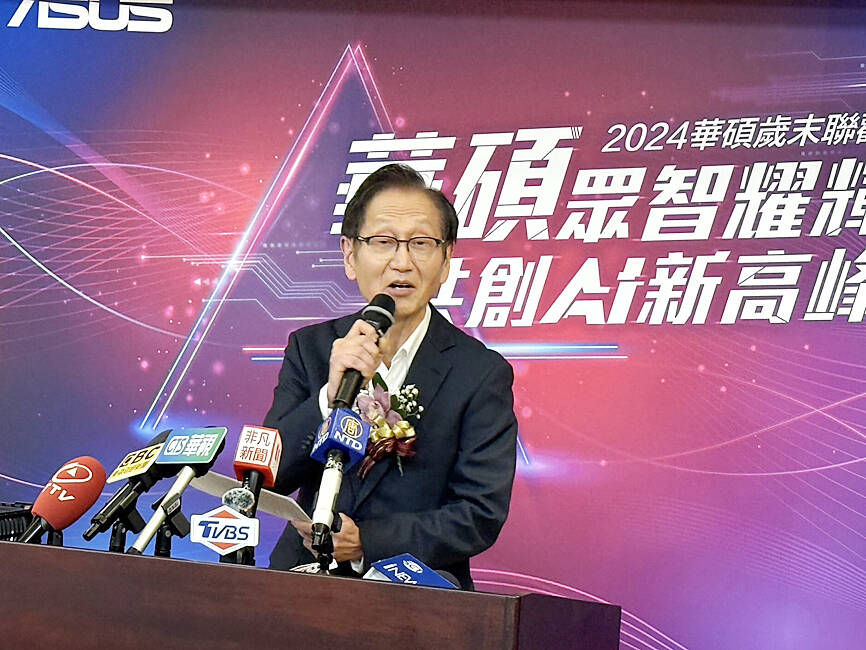PC vendor Asustek Computer Inc (華碩) will continue to develop artificial intelligence (AI)-enabled products and services this year, including PCs, servers, edge AI and artificial intelligence of things (AIoT) applications, the company’s annual shareholders’ report released on Sunday showed.
The rapid development of AI and an uncertain global environment are paving the way for major innovations, offering the company an opportunity to demonstrate its strengths, Asustek chairman Jonney Shih (施崇棠) said in the report.
“The faster the world changes, the bigger progress Asustek will make next year,” he said.

Photo: Vanessa Cho, Taipei Times
As the value and impact of personal computing products grow, the sector is poised for healthy market expansion, Shih said.
In this environment, upgrading products and launching strategic projects are crucial, with AI products and their applications driving innovation and market growth, he said.
Compared with its pursuit of product differentiation and competitive advantage through “incremental innovation” in the past, the company aims to achieve “radical innovation” to further enhance its competitiveness, as the market and technological advancements accelerate, he added.
Apart from expanding the company’s AI product lineups, Asustek will also focus on high-end products for high added-value users to enhance the user experience and the company’s brand value, Shih said.
In the enterprise market, Asustek would strengthen its regional deployment, and deepen its presence in commercial markets and channels in key countries, he said.
The company will also work with key platform manufacturers to jointly develop AI-driven products and applications to accelerate industry innovation and evolution, he added.
Asustek reported a 22 percent annual growth in consolidated revenue to NT$587.1 billion (US$18.08 billion) last year, the second-highest in the company’s history, and net profit rose 97 percent to NT$31.4 billion, or earnings per share of NT$42, the report said.
Last year, the company achieved key strategic goals, including maintaining its leading position in the PC market, strengthening its status as a top gaming notebook brand, achieving early growth in the server business and continuing development of its Open Platform framework to support product innovation, Shih said.
In the first quarter of this year, revenue increased 21.36 percent from a year earlier to NT$147.7 billion, company data showed.

NEW IDENTITY: Known for its software, India has expanded into hardware, with its semiconductor industry growing from US$38bn in 2023 to US$45bn to US$50bn India on Saturday inaugurated its first semiconductor assembly and test facility, a milestone in the government’s push to reduce dependence on foreign chipmakers and stake a claim in a sector dominated by China. Indian Prime Minister Narendra Modi opened US firm Micron Technology Inc’s semiconductor assembly, test and packaging unit in his home state of Gujarat, hailing the “dawn of a new era” for India’s technology ambitions. “When young Indians look back in the future, they will see this decade as the turning point in our tech future,” Modi told the event, which was broadcast on his YouTube channel. The plant would convert

‘SEISMIC SHIFT’: The researcher forecast there would be about 1.1 billion mobile shipments this year, down from 1.26 billion the prior year and erasing years of gains The global smartphone market is expected to contract 12.9 percent this year due to the unprecedented memorychip shortage, marking “a crisis like no other,” researcher International Data Corp (IDC) said. The new forecast, a dramatic revision down from earlier estimates, gives the latest accounting of the ongoing memory crunch that is affecting every corner of the electronics industry. The demand for advanced memory to power artificial intelligence (AI) tasks has drained global supply until well into next year and jeopardizes the business model of many smartphone makers. IDC forecast about 1.1 billion mobile shipments this year, down from 1.26 billion the prior

People stand in a Pokemon store in Tokyo on Thursday. One of the world highest-grossing franchises is celebrated its 30th anniversary yesterday.

Zimbabwe’s ban on raw lithium exports is forcing Chinese miners to rethink their strategy, speeding up plans to process the metal locally instead of shipping it to China’s vast rechargeable battery industry. The country is Africa’s largest lithium producer and has one of the world’s largest reserves, according to the US Geological Survey (USGS). Zimbabwe already banned the export of lithium ore in 2022 and last year announced it would halt exports of lithium concentrates from January next year. However, on Wednesday it imposed the ban with immediate effect, leaving unclear what the lithium mining sector would do in the